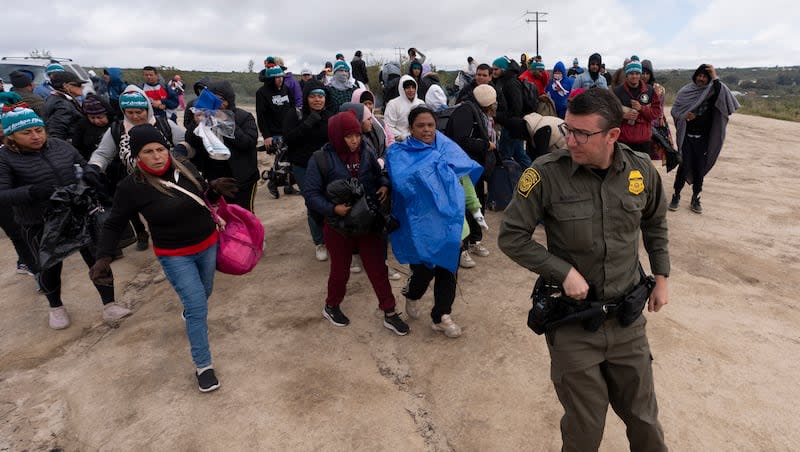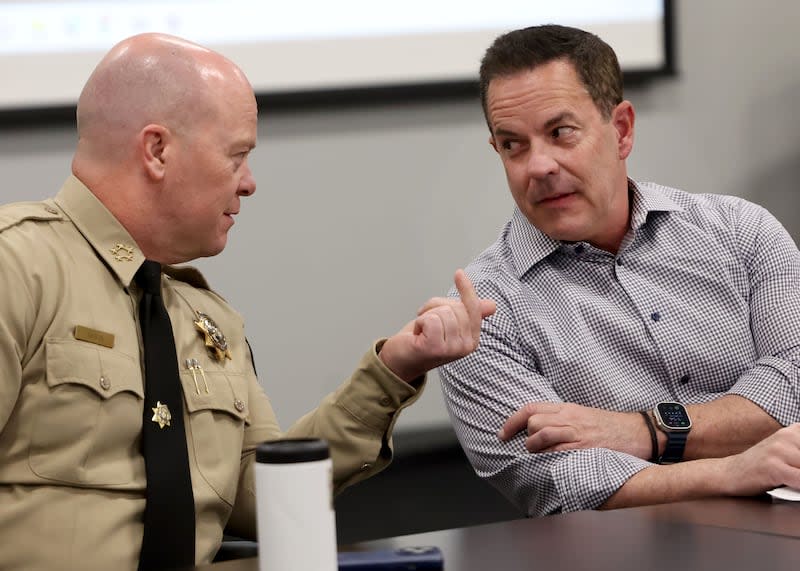‘This is affecting every Utahn every day’: GOP Senate candidates outline position on border, immigration

- Oops!Something went wrong.Please try again later.
U.S. Senate candidate Brad Wilson convened an immigration roundtable with his former state legislative colleagues and members of local law enforcement ahead of Utah’s Republican primary on June 25 to explain his position on the top issue for many GOP voters: the border.
Wilson, who served as Utah House Speaker from 2019 to 2023, hosted the hourlong closed-door meeting on Friday with sheriffs from nine Utah counties and three state lawmakers about the impact illegal immigration has had on the state. He then led a discussion with local media on his views on how federal immigration policy needs to change.
“These open border policies, which is what the United States is operating under right now, are making their mark in this country, they’re changing the West and they are changing Utah,” Wilson said at the Weber County Sheriff’s Office press conference. “When I talk to voters and ask them what their biggest concern is right now, it is illegal immigration, without a doubt. That’s why we’re here today.”
The topic of America’s porous southwestern border and overburdened immigration system has dominated ads, billboards and media appearances for Utah’s four Republican Senate hopefuls in their heated and highly expensive race to replace Sen. Mitt Romney in Utah’s first competitive open Senate race in decades.
The Deseret News interviewed each of the GOP candidates — Rep. John Curtis, Riverton Mayor Trent Staggs, Moxie Pest Control CEO Jason Walton and Wilson — about their stances on specific border enforcement policies, the impact of immigration on Utah and the distinction between border security and broader immigration reform.
While each has labored to define a lane for themselves among Utah’s Republican primary electorate, the candidates’ responses were relatively uniform. Each placed the blame for current problems on the current president instead of Congress, called for a return to the border security policies of Donald Trump and described illegal immigration as a top issue for Utah voters this election cycle.

Immigration: A top issue for voters
Polls show immigration certainly is a top issue for voters across the country, especially Republicans.
A February Pew analysis found that between 2021 and 2022 the percentage of Republicans saying immigration was a top policy priority rose from 39% to 67%. That share has now increased to 76%, the survey found.
Americans of all political stripes are more likely to list immigration as their No. 1 concern than any other issue, with nearly 30% of the country ranking it first, over things like the economy and poor governance, according to a Gallup poll conducted in March. And nearly 85% of all Americans say immigration is an important issue to them, according to an April poll from The Economist and YouGov.
And no wonder. Fiscal Year 2023 saw the greatest number of encounters between Border Patrol agents and undocumented immigrants crossing into the country between ports of entry in U.S. history.
Around 3.2 million apprehensions occurred during that time, according to U.S. Customs and Border Protection data. This number does not include the hundreds of thousands of known “gotaways” who evaded border patrol.
The year was capped by the highest monthly total on record, with 250,000 migrant encounters at the South Western Border in December alone. The prolonged spike in encounters coincided with the end of COVID-19 lockdowns and the beginning of President Joe Biden’s time in office.
The fault of Biden or Congress?
U.S. Senate candidates in Utah say the historic numbers of illegal border crossings are a choice by the Biden administration, which quickly rescinded many border enforcement orders from the former president upon taking office.
Wilson called the “crisis” at the southern border “wholly preventable,” saying if Biden were to reinstate the “Remain in Mexico” executive order signed under Trump that forced migrants seeking asylum to wait out their immigration proceedings on the other side of the border “this emergency could go away almost overnight.”
Walton agreed that “with the stroke of a pen” Biden could reverse his administration’s policy of “catch and release,” which says that migrants who meet a lowered threshold for asylum claims can be let into the country on parole until a court date, often five or more years into the future.
Walton said the fact Biden hasn’t done this yet is evidence that high levels of immigration might be benefitting Biden politically, whether in terms of appeasing his base or increasing the census count, and political representation, of blue states. This claim was echoed by Wilson.
Staggs, who was endorsed by Trump shortly before winning the nomination of state GOP delegates in April, also said Biden has the authority to “secure the border today.” However, considering the volatility of presidential orders, Staggs said Congress should consider tying the president’s hands.
“Legislatively, we need to not allow so much discretion on the part of the executive in terms of enforcing the law,” he said.
Curtis agreed it is “frustrating to Congress” that regardless of the laws on the books a presidential administration has wide latitude on how they’re enforced. As a congressman, Curtis said it is the legislature’s job to fix broken immigration policy and the president’s job is to enforce it.
What would Utah Senate candidates do to secure the border?
During a recent visit to the Arizona border, Curtis said law enforcement told him that resurrecting the “Remain in Mexico” program, officially known as “Migrant Protection Protocols,” would solve “90% of the problem.”
Curtis said the policies found in the Republican House Majority’s H.R. 2, which Curtis helped pass in the House along party lines last year, is also a good place to start. The bill, which hasn’t been taken up by the Senate, would put “Remain in Mexico” into statute, fund the completion of a border wall and require employers to use E-Verify to confirm worker eligibility.
But such restrictions on immigration should be paired with an expansion of work visas so that Utah industries, like agriculture, aren’t struck a harmful blow, Curtis said. He added that he, along with most congressional Republicans, rejected a recent bipartisan effort in the Senate to increase border security and immigration processing capacity because it did not pass through the regular legislative process.
Walton also called for codifying “Remain in Mexico” and criticized the bipartisan Senate deal for tying border security to foreign aid for Ukraine, Israel and Taiwan.
“I feel like this is the Democrats holding the United States’ security hostage,” Walton said. “I think that all of the conversation should be about securing our southern border.”
Walton and Staggs also said they would have supported H.R. 2. But Staggs said he would have gone further to implement policies like prohibiting migrants who enter the country illegally from accessing welfare benefits which he said would encourage “self-deportation.”
All four candidates agreed that the country needs a simplified immigration system for individuals who have the desire and skills to contribute positively to America — Wilson said the country needs generational “wholesale immigration reform.” But the candidates said such an effort is secondary to addressing the crisis at the border.
“There’s an order of operations here,” Walton said. “It’s like you have an injury that could be immediately catastrophic and then the doctors are having a good conversation about your broken wrist.”
Is illegal immigration affecting Utahns?
In the more than 80 town halls he has held, Staggs said border security has been “at the forefront of Utahns’ minds.”
Staggs said he believes policies that increase illegal immigration into places like Texas, New Mexico, Arizona and California have made housing more unaffordable, increased violent crime and strained public resources.
He said Utah Immigration and Customs Enforcement officials have told him they are aware of over 100,000 undocumented migrants in Utah, which “exacerbates the housing availability and affordability issue here in the state” and has resulted in rare instances of violent crime by individuals that likely should have been deported following previous crimes.
Walton said the scene of migrants entering the country by the thousands gives voters a sense of lawlessness and unfairness. Curtis said one of the biggest national security threats isn’t necessarily the people coming in — who he said are contributing to the breakdown of “social network systems” in places like New York City — the larger threat are the groups sending them here.
“As we have backed away from our responsibility to the border, the cartels have filled that void,” Curtis said.
The cartels’ human trafficking has brought drugs and other difficulties to Utah, according to the sheriffs at Wilson’s event on Friday, who represented areas from Cache County to Washington County.
Washington County Sheriff Nate Brooksby said a few years ago they recovered just a few hundred fentanyl pills annually. In 2023, the number topped 167,000. Just since last year, fentanyl seizures have increased by 500%, after increasing by 300% the year before, said state Rep. Ryan Wilcox, R-Ogden.
“Make no mistake, this is affecting every Utahn every day,” Wilson said.

